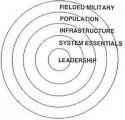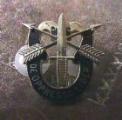For all the talk about religion and tribes, I know they were underlying factors---as were clans, families--- but if you looked at a lot of what the Kurds, for example, were focused on, it was almost purely political/administrative in nature---shifting political and voter balance one nahia at a time.
That conveys a very sophisticated and highly directed administrative and political understanding.
What were the reactionaries doing? Mostly focused on disruption of economic and infrastructure systems.
Was their affiliation and focus religious in nature? No. It was administrative/political.
By contrast, I am trying to follow the events in the many Afghanistans to understand the nature and purpose of the different actors.
At the risk of over simplification:
At present, the national government seems to be focused on controlling the structure and direction of international aid flows, and does so with support/cooperation of drug manufacturing/distribution systems; which have grown to become some of the largest in the world. I'm not reading a lot of religious zeal behind that.
A lot of knowledgeable people have described the various opponents as (1) competing sets of organized opposition whose internal differences are not marked by religion; (2.) an overall diminished focus on harsh religion (Sharia) to the extent that it reduced public support; and (3.) an overall and very sharply focused administrative/political purpose, including the targeting of elections, the appointment of shadow governments, and the "exercise" of power in areas like RoL, security assurance, and economic activity flows.
OK, Mullah Omar has, behind all this, a religious intent, but the focus, ways and means, all seem overwhelmingly driven by administrative/political purpose.
If I was just a dumb political strategist, I would think about what I can control, and what isn't worth the effort right now.
Leaving the central government and its drug systems aside for a moment, can I, through intimidation and asymetrical efforts, gain credible administrative/political control in other areas?
If I launch a "nationwide campaign," say through shadow government, can i define the scope of my support in different areas, and, from that, develop the next plan for, say, a spring push to consolidate gains?
If I avoid the central cities, but establish sufficient functional control of regions, corridors, etc..., do I have everything I need at this stage, to lay the foundation for the next?
Maybe also, through skillful negotiation and profitable business arrangements, I can prosperously co-op the drug folks, and/or partner with them so we can all work together (even if my religious convictions abhor drugs)?
One of my big assets, unlike my opponents, is that I can pop-up at will (since I am not burdened by their administrative/political/security baggage, and, I have no regard for the "democratic" effort to win their hearts and minds. If my stick is big enough (civilian deaths), they will side with me out of fear vs. free choice (Who cares?).
Besides, I am a stateless person anyway, as my Pashtun lands (the real Afghanistan) were long ago, and arbitrarily carved up by the big powers who play the big game over our heads (Who cares about their versions of nations and power structures anyway?).
Moreover, the arbitrary national lines are a substantial asset to my operational strengths as my associations, allegiances and lines of operation are beyond them, while they pose major constraints on my opponents.
Despite my religious opposition to these technically sophisticated and amoral foreigners, I will also use technology where ever I can if it works for me. Streaming video, pop music, Drone feeds, GoogleEarth, etc...
But, because I am much more like one of the people, it is very easy to use their backwardness and distrust of foreigners and new things as a wedge between us. I'll even pull out the Quran card if I have to, and blame the peoples' deaths on the inevitable and holy struggle against the infidel foreigners. (It seems to work well).
XXXX
Again, a great generalization that could be 180 degrees different in any particular place, but, like Iraq, I see a great deal of administrative/political purpose, and not a lot of religion going on.
Now, if I was serious about undermining that, I would not have religious intents, just a huge respect for the role of religion in those people's lives, and try to fit my efforts into their frameworks and narratives.
But my focus would be the same as theirs--administrative/political/economic. And max out the use of technology and education.
Two bits on religion in this conflict.



 , he was religious has he is a hardcore communist.
, he was religious has he is a hardcore communist. 






 - as I was thinking of the Chinese Sun guy:
- as I was thinking of the Chinese Sun guy:


Bookmarks